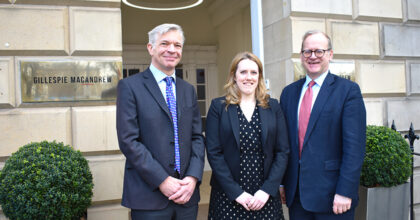In progressing an executry, it is not uncommon for conflict to arise between executor and beneficiary. In particular, a beneficiary who knew the deceased well may be surprised to find that the sums available for distribution are significantly lower than expected. That surprise often gives way to suspicion, and disappointment breeds questions: How do I find out what is due to the estate and, in turn, to me?
What can a beneficiary do?
The law provides a remedy to beneficiaries in the form of an action of count, reckoning and payment (commonly “an action of accounting” or simply “an accounting”). The executors are called on to account for their intromissions with the deceased’s estate. If that accounting discloses missing funds, the executors are potentially liable to make good the discrepancy personally.
Why raise an action of accounting?
An accounting is a rare thing in the law. Rare because, first, it permits a fishing exercise for information and, secondly, because one need not suggest any wrongdoing on the part of the information-holder to exercise it.
In an accounting, (i) the pursuer does not need to specify the amount due, and (ii) the burden lies on the defender to account and produce their vouching. That, in turn, ascertains any amount that the defender is liable to pay. That approach contrasts with most court actions, in which the onus lies on the pursuer to specify and prove what is due.
What if the executor fails to account?
If met with silence from the executors, a beneficiary can crave payment of all sums which <might> be due to the estate. Payment of that sum is the alternative if the executors fail to account. That crave is said to be <in terrorem> – “in fear”. It is one of the few instances in which a threat, albeit one to encourage the executors’ good behaviour, is sanctioned by law.
The process encourages uncooperative executors to engage with beneficiaries. If they fail to do so, they could be found liable for a sum greater than that which they would otherwise require to pay.
Who can raise an action of accounting?
An accounting may only be demanded in certain instances. The exact scope of its availability is uncertain, though Lord Maxwell attempted to define it, to a degree, in <Coxall v Stewart> 1976 SLT 275 at 276:
“Where assets belonging to one person come into the possession of another and where the person to whom the assets belong has, broadly speaking, a right to recover those assets or their value from the possessor, but where the nature of the property, or the rights and obligations of the possessor, or both are such that the intromissions of the possessor may affect the precise extent or value of the owner’s claim against him, at least in some cases our law provides the remedy of an action of count reckoning and payment.”
In broad terms, one tends to see it engaged where the relationship between the parties is founded on a high degree of trust, particularly where that trust is expressed in the responsibility (and power) granted by one person to another to manage that person’s assets. An accounting is a nuclear weapon, capable of levelling the playing field between accountee and accounter.
While there is no prescribed list, the relationships which give rise to the duty include that between executor and beneficiary. They also include the relationship between a person acting under a power of attorney and the granter of that power of attorney. It is not uncommon for an executor, stepping into the shoes of the deceased, to seek an accounting from an attorney to disclose the attorney’s intromissions with the deceased’s funds in life (and, accordingly, to disclose whether any sums ought to be repaid to the estate).
While a beneficiary has an interest in knowing whether an attorney is due to pay into an estate (as it may affect their share), there is no direct relationship between the attorney and beneficiary such that the beneficiary can raise proceedings against the attorney. That can give rise to complexities where, as is often the case, the same person is appointed as attorney in life and executor on death.
Accounting by an attorney/executor
In <Currie v Blair> 2023 SLT 113, reversing 2023 SLT 34, the parties were siblings by adoption. They were both appointed as their father’s attorney. However, only Blair had exercised her powers during their father’s life. The father died in January 2015, appointing Blair as his executor. As management of the estate progressed, Currie began to suspect that the value of their father’s estate was lower than it should be. She knew that Blair had, in the past, withdrawn sums from her father’s bank accounts as attorney. Currie raised an action against Blair. She sought an order from the court that would require Blair, as executor, to seek a full accounting of her own intromissions as her father’s attorney.
In doing so, Currie recognised that she, a beneficiary of the estate, had no direct relationship with Blair in her capacity as attorney, such that she could demand an accounting from her. A beneficiary does, however, have a right to demand an accounting from an executor. What was at issue here was whether a beneficiary can demand that the executor seek an accounting from the attorney.
At first instance, the court deemed Currie’s action “artificial”. It was an attempt by a beneficiary to seek an accounting from an attorney “through the back door”.
That decision was reversed on appeal. While the court recognised that a beneficiary has no title to raise an action against an attorney, the present action was raised against the executor. It was raised on the basis that an executor can be called upon by a beneficiary to realise and account for an asset of the estate. At para 18 the court said: “the reclaimer is a party to a legal relation with the executor which gives her the right to require the executor to implement her fiduciary duty by ingathering assets forming part of the estate for distribution to the persons entitled thereto, including herself”.
That remedy sees the executor account for any part of the deceased’s estate that she has failed to realise (should any exist), including any sums that she should have repaid into the estate in her separate capacity as the deceased’s attorney.
Averting suspicion
An action of accounting is a powerful tool when it is available. In most cases, the existence of the relationship that gives rise to it will be obvious. It lies between partners, executor and beneficiary, principal and attorney, and solicitor and client. However, it may not always be so obvious. Difficulties may arise when the accounting is sought from someone who acts in two or more separate capacities, as in <Currie v Blair>.
Attorneys and executors must be alive to this remedy and should keep detailed records of their dealings with the estate. Suspicion often arises where an executor has acted as attorney for the deceased in life and as practitioners, we should be alive to that possibility when advising clients on who they should appoint as their executors. One might mitigate against suspicion by appointing a second or third executor to act as well and, where a question arises which the former attorney has an interest in, the others can decide it. That breeds trust and confidence.
The existence of trustee companies might be brought to a client’s attention as a potential appointment. A professional executor can be an impartial actor in an otherwise emotionally-charged situation, and their presence often quells suspicion before it arises, and provides expertise, objectivity, and experience.
If you have any queries relating to disputes over executries, please get in touch with our dispute resolution team.






